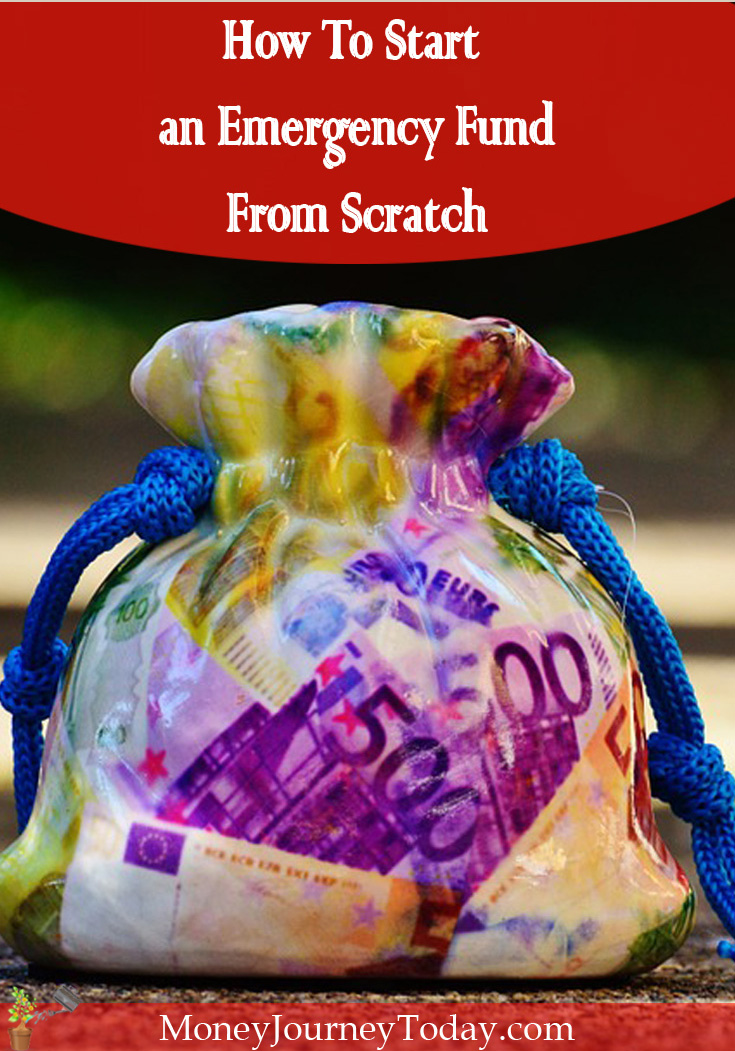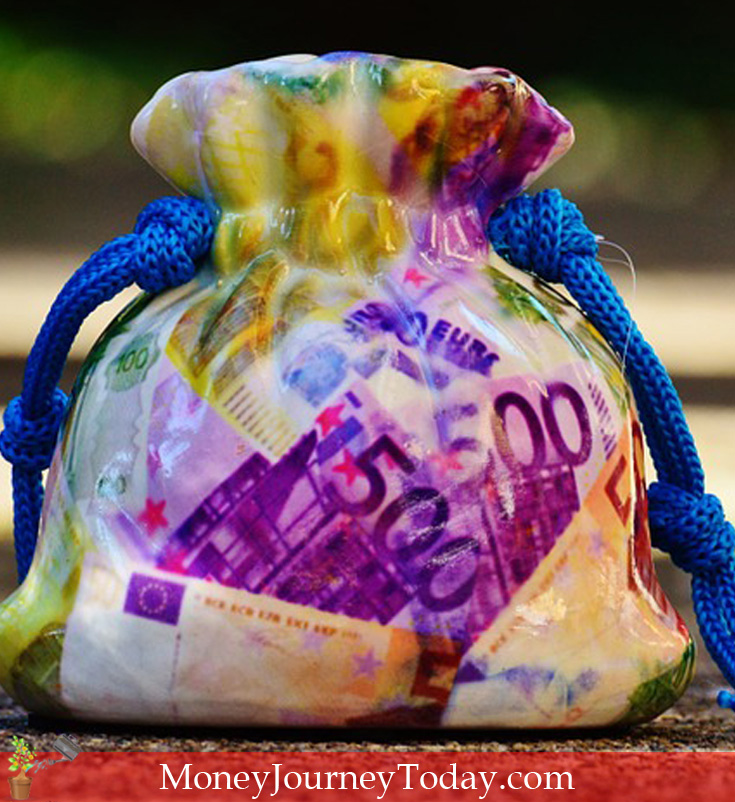Everyone is (or should be) aware of the importance of saving money for unexpected, yet needed, expenses. But how do you start an emergency fund from scratch?
Without doubt, it’s always better to be safe than sorry, in any given situation.
Unexpected events can happen at any time.
Whether we like it or not, the car won’t ask for our permission to break down, nor will a sudden dental problem wait until you have enough money stashed away to pay the dentist.
Saving money and building an emergency fund from scratch seems like a daunting financial task though. Especially if you don’t live big, like apparently the Joneses always do.
How can you start an emergency fund, even when living paycheck to paycheck? Here are some ideas that might help.
How to start an emergency fund
from scratch

Starting an emergency fund from scratch can be intimidating for most people.
Most likely, if you don’t have an emergency fund in place already, you’re not used to saving money on a regular basis.
Shifting your mentality from spending all your paycheck to saving part of it to achieve a goal can be scary and, in many cases, difficult.
Understand why you need an emergency fund
Before you start saving anything, think about the big picture for a moment.
If you lost your job today, could you handle it, financially? Can you pay your rent/mortgage and bills?
First thing to understand before even thinking of starting an emergency fund, is its importance.
Maybe losing your job isn’t the best example. After all, you may qualify for unemployment. Or move back with your parents. Or rent your home to earn extra income.
But what about a medical emergency? A costly treatment or surgery usually requires you act immediately, not after months or procrastination.
Start small – Baby steps
Now that you understand the need to save, time to get crackin’.
Most experts recommend you have enough funds saved up to last for at least the next 3 to 6 months. Of course, having more in savings is even more beneficial.
This requires you to figure out how much money you need, on a monthly basis, to live comfortably.
Summing up your important expenses (housing, bills, food… etc.) could be enough to have your jaw drop. Now multiply it by 6, just make sure you don’t faint.
Starting an emergency fund with no money can be terrifying. This is why starting small should help.
Set your first targets low if you think it’ll help, and start by saving enough to last for, say, 1 month. Move your way up to 3 months in savings. Then 4, and so on.
Alternatively, set small savings goals, and work from there: set your initial goal to saving $500. Then $1,000. And so on.
Take baby steps. You won’t be able to set up a substantial emergency fund overnight. And knowing you need to save that much money is rather scary than motivating.
Plan your savings
Starting small is helpful and all, but you’ll have to make a savings plan and stick to it.
Creating a budget can help.
By tracking all your income and outgoing expenses, you can safely start saving without worrying you won’t have enough left at the end of the month to buy food!
Make a plan to save a certain amount each month (or week) and cut unneeded expenses from your other budget categories.
For instance: start saving money on electricity and slash your water bill, stop keeping up with the Joneses and focus on your needs rather than wants. Basically, aim to spend less and save more!
Starting small means you can start by saving even $20 a month. It seems like nothing (and yes, this will take you a long time to reach your savings goal), but no matter how small, a start is a start!
$20 today, $30 next month and $50 afterwards, you’ll have +$100 saved up after 3 months, instead of a negative balance.
Make sure your emergency fund is accessible
Having an emergency fund is essential, but what’s the point in having one if you can’t access it immediately when you need it most?
Savings accounts at banks or credit unions are a good option. You get a return of deposit (it’s usually really small, but better than nothing) and you should be able to access your money without penalties whenever you need.
Other options are also available. Online savings accounts, certificates of deposit, there are quite a few ways for you to store your cash.
Do some research and see which option best fits your needs. Ideally, you should be able to access your money quickly (if case of emergency). Meanwhile, earning some interest is a good perk.
PS: Remember to only access your emergency fund if you need it! Wanting to buy a new pair of shoes is not exactly an emergency!
Automate your savings
If you want to make sure you stick to your savings plan, try automating your savings.
This way, you can save money on a regular basis, no excuses.
Of course, you’d have to adjust your other expenses so you won’t end up broke at the end of the month.
Figure out how much you can set aside from each paycheck and put your savings on autopilot.
Boost your income to boost your emergency fund
Are you motivated to start your emergency fund? Good!
Do you have a goal in mind? Great!
Now all you need is the money to get there.
In theory, everyone should be able to cut their expenses and save more money.
We all make unnecessary purchases. Whether it’s that cup of coffee you buy on your way to work or that shirt you just had to buy or that pizza you ordered at home because you’re too tired to cook.
However, becoming frugal won’t always help. In which case, earning some extra money might be just the thing you need to reach your money goals faster.
Getting a second job is the first thing that usually comes to mind. Many have a part time gig on the side.
Alternatively, you could start a side hustle of your own. You could turn a hobby into a small business. Start a blog and attempt to monetize it. Babysit, pet sit, maw lawns on weekends.
Anything works, as long as you know how to sell your services to the right crowd and aim to offer quality every single time.
If you’re looking to avoid debt and build some financial stability, an emergency fund should be a must!
It can be overwhelming to start with no money, but taking baby steps is a safe and sure way to reach that goal one day.
Do you have an emergency fund in place?
What helped you most when saving up for emergencies?

[…] Since mortgage loans have low interest rates, your return on investment will be obviously low. Instead of doubling your payment, it is better to allocate the extra cash to other expenses like your child’s education, paying another debt, or build an emergency fund. […]
[…] lack of personal savings can prove to be a significant problem in the event of unexpected emergencies that may occur in […]
[…] are regularly putting money away into an IRA or 401 K, working at a job you like, or consistently building your emergency fund, these are things to be […]